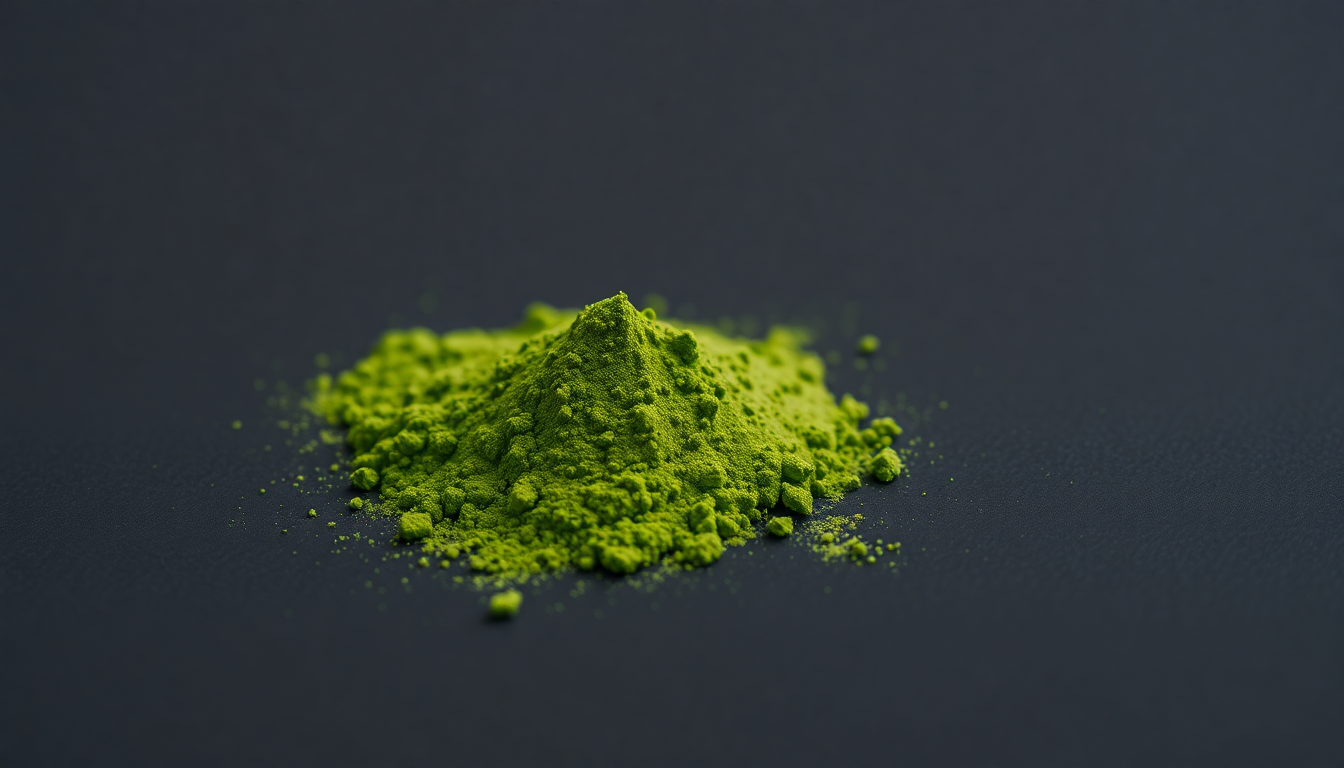Organic Matcha Powder with Herbal Monkey

In the ever-evolving world of health and wellness, one superstar ingredient has captured the attention of health-conscious individuals across the globe - organic matcha powder. As a UK-based supplier of the finest organic dried herbs and flowers, Herbalmonkey is proud to offer our customers the opportunity to experience the transformative benefits of this remarkable green powder.
What is Organic Matcha Powder?
Matcha is a finely ground powder made from the leaves of the Camellia sinensis plant, the same plant used to produce traditional green tea. However, what sets matcha apart is the unique cultivation and processing method. Matcha leaves are grown in the shade, which increases their chlorophyll content and gives them a vibrant green hue. The leaves are then carefully stone-ground into a fine powder, preserving the entire nutrient profile of the leaf.
The origins of matcha can be traced back to ancient China, where it was revered for its medicinal properties and spiritual significance. It later found its way to Japan, where the traditional tea ceremony, or chanoyu, became an integral part of Japanese culture. Today, matcha has transcended its cultural roots, becoming a global phenomenon celebrated for its exceptional health benefits and versatility in culinary applications.
The Health Benefits of Organic Matcha Powder
Organic matcha powder is renowned for its impressive antioxidant content, which can help combat the damaging effects of free radicals and support overall well-being. The unique growing and processing methods used to produce matcha ensure that the powder retains a higher concentration of beneficial compounds compared to traditional green tea.
One of the standout benefits of organic matcha powder is its ability to enhance energy and focus. Matcha contains a moderate amount of caffeine, combined with the amino acid L-theanine, which works synergistically to provide a calm, sustained energy boost without the jittery effects often associated with coffee. This makes matcha an excellent choice for those seeking a natural alternative to traditional stimulants.
In addition to its energizing properties, organic matcha powder has also been linked to improved metabolism and weight management. The catechins found in matcha, particularly EGCG, have been shown to increase fat burning and support healthy weight loss when combined with a balanced diet and regular exercise.
Matcha's calming and stress-reducing effects are another key advantage. The L-theanine in matcha has been found to promote relaxation and reduce anxiety, making it a valuable tool for managing daily stress and promoting overall well-being.
Herbalmonkey: Your Trusted Matcha Powder Supplier in the UK
At Herbalmonkey, we are passionate about providing our customers with the highest-quality organic dried herbs and flowers, including our exceptional organic matcha powder. As a UK-based supplier, we are committed to sourcing the finest matcha from reputable producers who adhere to strict organic and sustainable farming practices.
Our matcha powder is carefully selected and tested to ensure it meets the highest standards of purity and potency. We take great pride in our commitment to transparency, providing our customers with detailed information about the origin, processing, and quality of our matcha products.
Understanding Matcha Grades and Quality
When it comes to matcha powder, not all products are created equal. The quality of matcha can vary significantly, and it's essential to understand the different grades to ensure you're getting the best value for your money.
Ceremonial-grade matcha is the highest quality, typically reserved for traditional Japanese tea ceremonies. This grade is characterized by a vibrant green color, a smooth, umami-rich flavor, and a delicate, frothy texture when whisked with hot water.
In contrast, culinary-grade matcha is better suited for use in baking, smoothies, and other culinary applications. While it may not have the same refined flavor profile as ceremonial-grade, culinary-grade matcha is still an excellent source of antioxidants and other beneficial compounds.
At Herbalmonkey, we carefully source and select our organic matcha powder to ensure it meets the highest quality standards, regardless of the intended use. Our team of experts is dedicated to helping our customers understand the nuances of matcha quality and make informed purchasing decisions.
Incorporating Matcha into Your Daily Routine
Incorporating organic matcha powder into your daily routine is a simple and enjoyable way to reap its numerous health benefits. The traditional method of preparing matcha involves whisking the powder with hot water to create a frothy, vibrant green beverage. This ritual not only produces a delicious cup of tea but also promotes mindfulness and relaxation.
Beyond the traditional preparation, matcha powder can be easily incorporated into a variety of modern recipes. From smoothies and lattes to baked goods and desserts, the versatility of matcha allows you to enjoy its benefits in a way that suits your personal preferences and dietary needs.
When it comes to dosage, it's generally recommended to start with a small amount, such as 1-2 teaspoons of organic matcha powder per day, and gradually increase as desired. Matcha's caffeine content should also be taken into consideration, especially for those sensitive to stimulants.
Matcha vs. Other Green Teas
While matcha and traditional green tea both come from the Camellia sinensis plant, there are several key differences that set them apart. Matcha is unique in that the entire leaf is consumed, rather than just the brewed infusion. This means that matcha provides a more concentrated dose of beneficial nutrients, including antioxidants, vitamins, and minerals.
Additionally, the shaded growing process used for matcha results in a higher chlorophyll content, giving it a vibrant green color and a distinct, umami-rich flavor profile. In contrast, traditional green teas are typically made from leaves that are not shaded, resulting in a lighter color and a more grassy, astringent taste.
Another notable difference is the caffeine content. While both matcha and green tea contain caffeine, matcha generally has a higher concentration due to the way it is processed and consumed. This makes matcha an excellent choice for those seeking a natural energy boost without the jittery effects of coffee.
Sustainability and Ethical Considerations in Matcha Production
As the demand for organic matcha powder continues to grow, it's essential to consider the environmental and social impact of its production. At Herbalmonkey, we are committed to sourcing our matcha from suppliers who prioritize sustainable and ethical practices.
The cultivation of matcha leaves requires careful attention to detail, as the plants must be shaded for several weeks before harvest to achieve the desired nutrient profile. This process can be labor-intensive and requires a deep understanding of the land and climate. By supporting organic and fair-trade matcha producers, we can ensure that the farmers and their communities are treated with the respect and compensation they deserve.
Furthermore, the processing of matcha powder is a delicate and time-consuming task, requiring specialized equipment and expertise. At Herbalmonkey, we work closely with our suppliers to ensure that the entire supply chain, from cultivation to packaging, adheres to the highest standards of environmental sustainability and ethical practices.
Storing and Preserving Your Matcha Powder
Proper storage and preservation are essential for maintaining the quality and freshness of your organic matcha powder. Matcha is highly sensitive to light, heat, and moisture, which can quickly degrade its flavor, aroma, and nutritional profile.
To ensure your matcha powder stays fresh and potent, it's important to store it in an airtight container, away from direct sunlight and heat sources. The container should be kept in a cool, dry place, such as a pantry or refrigerator. Avoid storing matcha in the freezer, as the fluctuations in temperature can cause condensation and compromise the powder's quality.
When it comes to shelf life, high-quality organic matcha powder can typically be stored for up to 6 months when properly stored. However, it's always best to check the expiration date and consume the powder within the recommended timeframe for optimal freshness and potency.
Conclusion: Embracing the Matcha Lifestyle with Herbalmonkey
As you've discovered, organic matcha powder is a true powerhouse of health and wellness benefits. From its impressive antioxidant content to its ability to enhance focus and promote relaxation, matcha is a versatile and transformative ingredient that can be seamlessly incorporated into your daily routine.
At Herbalmonkey, we are proud to be your trusted supplier of the finest organic matcha powder in the UK. Our commitment to quality, sustainability, and transparency ensures that you can enjoy the full spectrum of matcha's benefits with confidence and peace of mind.
Whether you're a matcha enthusiast or new to the world of this remarkable green powder, we invite you to explore the vast possibilities it holds. Embrace the matcha lifestyle and unlock a new level of health, vitality, and mindfulness with Herbalmonkey.
References:
- Weiss, D. J., & Anderton, C. R. (2003). Determination of catechins in matcha green tea by micellar electrokinetic chromatography. Journal of Chromatography A, 1011(1-2), 173-180.
- Dietz, C., Dekker, M., & Piqueras-Fiszman, B. (2017). An intervention study on the effect of matcha tea, in drink and snack bar formats, on mood and cognitive performance. Food Research International, 99, 72-83.
- Kochman, J., Jakubczyk, K., Antoniewicz, J., Mruk, H., & Janda, K. (2020). Health Benefits and Chemical Composition of Matcha Green Tea: A Review. Molecules, 26(1), 85.
- Sano, M., Tabata, M., Suzuki, M., Degawa, M., Miyase, T., & Maeda-Yamamoto, M. (2001). Simultaneous determination of twelve tea catechins by high-performance liquid chromatography with electrochemical detection. Analyst, 126(6), 816-820.
- Unno, T., Tago, M., Suzuki, Y., Nozawa, A., Sagesaka, Y. M., Kakuda, T., ... & Okamura, N. (2005). Effect of tea catechins on postprandial plasma lipid responses in human subjects. British Journal of Nutrition, 93(4), 543-547.






